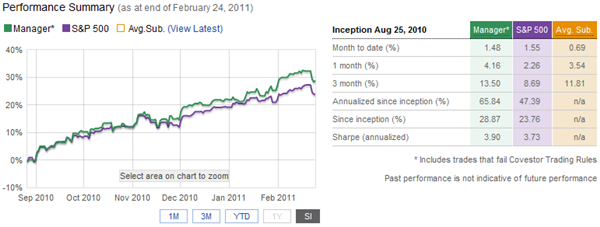Bob Preston of Craigmillar, LLC manages the Global Clean Energy-Clean Tech portfolio on Covestor. We had the opportunity to ask Bob about his thoughts on the impact of the recent turmoil in the Mideast on investing in the energy sector. His response:
Craigmillar focuses on the decarbonization of energy, i.e. the move from a carbon-based to a hydrogen-based world. As such, we don’t play oil directly but believe strongly that oil is the currency of the world and that what happens to oil affects everything. The recent turmoil in the Middle East is just one act in a play that may represent the ongoing decarbonization occurring around the world with regards to our consumption of energy. We are consuming less carbon-based energy on a relative basis worldwide and on an absolute basis in the US. This change is not often considered by the mainstream media, but this will affect the profitability of energy-based companies. All companies are based on a varied degree of energy input, so all companies are affected.
These recent events in the Middle East have not changed our investment process nor have they created more or less attractive candidates. They do however cast a positive light on all companies we follow as the political heat gets turned up on funding all types of alternative energy ideas. Thus solar, wind, natural gas, and even nuclear projects are able to more easily get funding and all of the feeder technologies supporting them also get a boost. While the Middle East situation has created fear about oil supply, we don’t see this as having any long term negative effects. Other suppliers, such as Saudi Arabia, continue to have plenty of supply that is purposely keep off the market to control any significant long term volatility in oil prices. That’s not to say that short term oil prices will not be affected. The real question for us is whether governments will continue to allocate investment in large alternative energy projects once the immediate crisis stabilizes. We think they will. The ongoing volatile nature of oil, including oil’s political environment will continue to keep pressure on countries to reduce the amount of oil dependency. The recent events may contribute to the relative lessening of oil as an energy source, as the world moves toward decarbonization. This is a long-term process that will continue to provide an advantage for selecting stocks that benefit from this decarbonization trend, and in aggregate, may continue to outperform the appropriate indices.
Here’s the recent performance of the Covestor Global Clean Energy-Clean Tech model:



